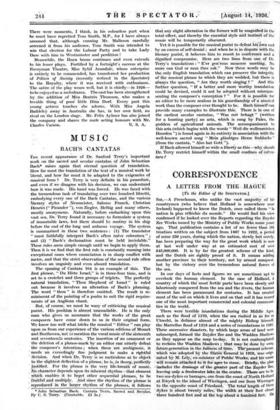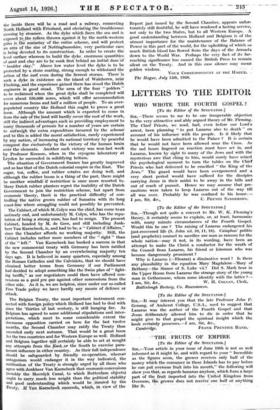CORRESPONDENCE
A LETTER FROM - THE HAGUE
[io the Editor of the SPECTATOR.] SIR,—A Frenchman, who unlike the vast majority Of his countrymen (who believe that Holland is somewhere near Iceland) happened to know the Dutch, once called them " la nation la plus refiechie du monde." He would find his view confirmed if he looked over the Reports regarding the .Zuyder Zee Works issued by the Ministry of Public Works some years ago. That, publication contains a list of no fewer than 581 treatises written on the subject from 1667 to 1922, a period of some 250 years, during which the nation, slowly.but surely, has.been preparing the way for the great work which is now at last well under way* at an estimated cont. of over £45,000,000. It is by far the greatest scheme of the kind, and the Dutch are rightly proud of it. It means adding another province to_ their territory, not by armed conquest, but by the victory over .1,11e, tremendous natural forces of the sea.
- In our days of facts and figures we are sometimes' apt to overlook the human element. In the case of Holland, it country of which the most 'fertile parts have been slowly and laboriously conquered froin the sea and the rivers, the hunian element has been paramount for centuries. It his created most of the soil on which it lives and on that soil it has reared one of the most important commercial and colonial communi- ties in the world.
There were terrible inundations during the Middle Ages, such as the flood of 1170, when the sea rushed in as far as Utrecht, in 'defiance almost of the mighty Bishop I himself, the Marcellus flood of 1218 and a series of inundations in 1287. These successive disasfeis, by which large areas of laird were submerged, formed the Zuyder Zee and the Wadden Shallows as they appear on the map to7day. It is not contemplated to reclaim the Wadden Shallows ; - that may- be done by some future generation in the fullness-of time. The presentScheme, which was -adopted. by the Seaten' (eneral in 1918, 'Was (AV- bY Lely; ek-minister of Public-Works; and'hiS naive • will remain attached to it for ages to dome. Briefly, the plan includes the drainage of the greater part of the Zuyder Zee, leaving only afreshwater lake in the, centre. There are. to be two sea-dykes or barrages, one from the coast of North Holland at Ewyck to the island of Wieringen, and one from Wieringen to the opposite coast of Friesland. The total length of these dykes is about twenty miles, the width at their fbot about - three hundred feet and at the ton about a hundred feet. 013 the inside there will be a road and a railway, connecting North Holland with Friesland, and obviating the troublesome crossing by steamer. As the dyke which faces, the sea and is exposed to ,the. rollers thrown against it by the north-western gales is i6 mainstay of the entire scheme, and will protect.
. .
an area of the size of Nottinghamshire, very particular care is being devoted to its construction. In order to create the level surface whereon to build the dyke, enormous quantities of sand and. clay areto be sunk first behind an initial dam'Of " boulder clay." Above low water level the dyke is to be protected by a stone coating, strong enough to withstand the action of the Surf even during the fiercest storms. There is such a dylce in existence on the island of Walcheren, near Flushing,.and the experience gained there has stood the Dutch engineers in good stead. The area of the four " polders " to be reclaimed when the great dyke shall be completed will cover, about 556,000 acres, which will offer accommodation for numerous farms and half a million of people. To an over- populated country like Holland this ought to prove a great boon. Although the amount which is expected to come in from the hale of the land will hardly cover the cost of the work, still the indirect:advantages such as providing employment to many thousands of persona for al number of years are certain to outweigh the -extra expenditure incurred by the scheme' and to this is added the moral satisfaction, rarely experienced by any nation, of increasing its national territory by peaceful conquest due eicelusively to the victory of the human brain over the elements. Another such victory was won last week by Professor Keesom, when in the cryogene laboratory at Leyden he succeeded in solidifying helium.
The situation of Government finance has greatly improved and so has'that of the Dutch colonial empire in the East. The sugar, tea, coffee, and 'rubber estates are doing well, and although the rubber boom is a thing of the past, there might be another Windfall: if restriction' is once - more resorted to. Many Dutch rubber planters regret the inability of the Dutch Government to join the restriction scheme, but apart from economic 'theory, there is the practical difficulty of con- trolling the native grown rubber of. Sumatra with its long Coast line where smuggling could not possibly be prevented.
The Cabinet, of which M. Colyn was the chief; has come to an untimely end, and unfortunately M. Colyn, who has the repu- tation of being a strong Man; has had to resign. The present Cabinet, headed by M. de Geer, and still including Jonk- heer Van Karnebeek, is, and had to be, a " Cabinet, d'Affaires,' since the Chamber affords no working majority. Still, the Cabinet includes rather more members of the " right " than of the " left." Van Karnebeek has booked a success in that the new commercial treaty with Germany has been ratified by the Second Chamber by an overwhelming majority ten days ago. It is believed in many qtiarters, especially among the Roman Catholics and the Calvinists, that we should have obtained better terms from Germany if our Parliament had decided to adopt something like the Swiss plan of " fight- ing tariffs," as our negotiators could then have offered con- cessions as a quid pro quo against other concessions from the other side. As it is, we are helplesi, since under our so-called Free Trade policy we have hardly any means of defence or
attack. . .
The Belgian Treaty, the most inportant instrument con- nected with foreign policy which Holland has hid to deal with since the 'thirties of last century, is still hanging fire. As Belgium has agreed to some additional stipulations and inter- pretations, which meet to some considerable extent the strenuous opposition carried on here for the last twelve months, the Second Chamber may ratify the Treaty. thus amended early next autumn. That would be a great boon for the two -countries and for Western Europe as well. Holland and Belgium together will .certainly be able to set at nought any attempts from the .Fastisor the South to exercise para- mount influence in either country. . As their full independence should be safeguarded by friendly co-operation, whereas antagonism would endanger it in the way indicated, the ratification of the Treaty is strongly urged by all those who agree with Jonkheer Van Karnebeek that economic concessions (notably the Moerdyk Canal, to which Rotterdam objects) Ought to carry much less weight than the political stability and good understanding which would be insured by the Treaty, If Van Karnebeek succeeds, which, in view of the •
Report just issued by the Second Chamber, appears unfor- tunately still doubtful, he will have rendered a lasting service. • not only to the two States, but to all' Western Europe. A:. good understanding between Holland and Belgium is of the utmost importance for the maintenance of the Balance of Power in this part of the world, for the upholding of which so. much British blood has flowed from the days of the Armada down to the World War. Perhaps the very fact of its far- reaching significance has caused the British Press to remain. silent on the Treaty. And in this case silence -may mean golden wisdom.



































 Previous page
Previous page